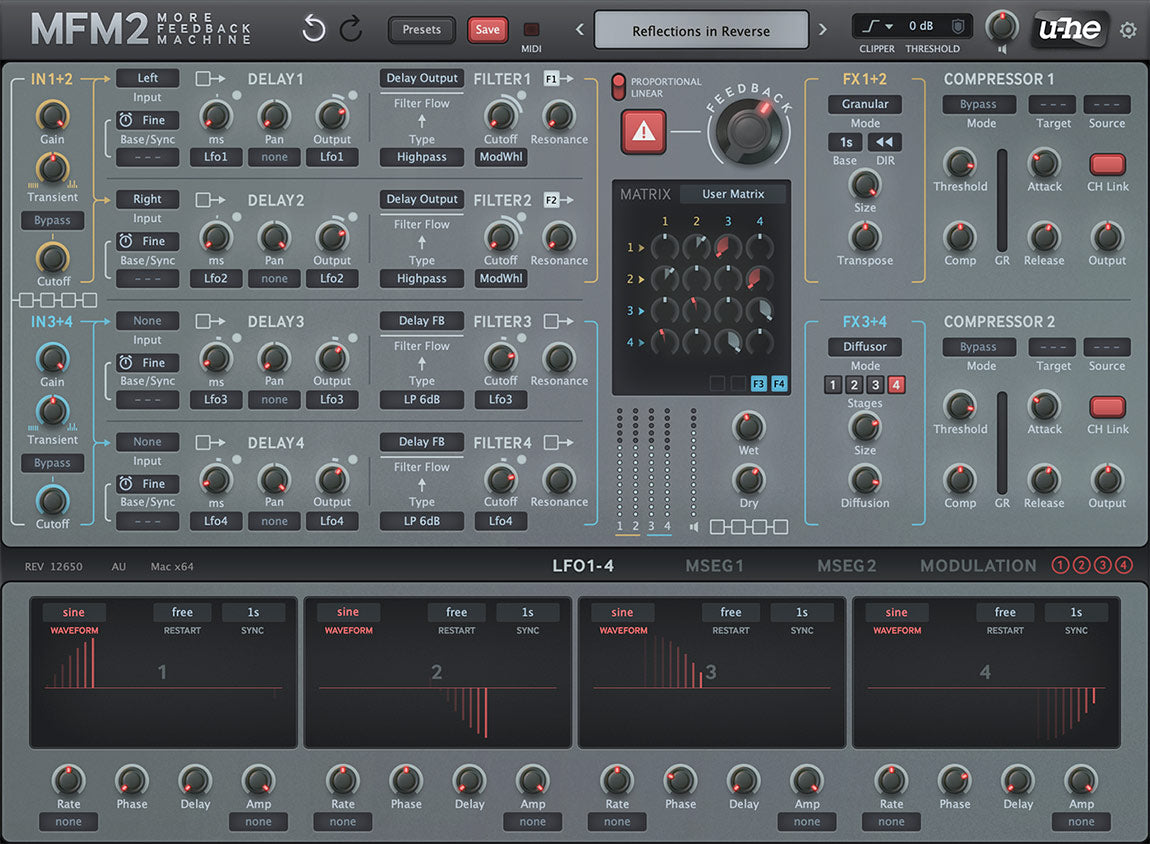Share
u-He MFM2
u-He MFM2
Couldn't load pickup availability
MFM2: More Feedback Machine
MFM2 is our over-the-top digital delay plug-in. You can create anything from subtle textured echos to huge spacey reverbs, from wild tonal steps on a pad to rhythmic deconstruction of a drum track. As a regular delay MFM2 already offers as much control and inspiration as possible, while the advanced features in version 2.5 open up wider horizons. More feedback, more control, more inspiration!
- New in version 2.5: input section with gain, filter and transient balance
- 4 delay lines with independent absolute time or tempo-synced modes
- Each delay line has its own multimode filter: 2x lowpass, bandpass, 2x highpass, bandreject or allpass
- 6 default delay configurations or user matrix (freely route signals between all 4 delay lines)
- 4 syncable LFOs with 8 waveform options or user definable shapes
- 2 syncable and loopable multi-stage envelope generator (MSEG) modulation sources
- 4-slot modulation matrix with depth modulation from a second source
- 2 channel-pair effects: soft clipper, bit crusher, phaser, frequency shifter, filter...
- New in version 2.5: granular (pitch shift, reverse delays) and diffusor (reverb)
- 2 channel-pair compressor/limiters, with peak or maximize modes
- New in version 2.5: output shield (soft clipper) with strength and threshold options
- Scalable UI from 70% to 200%
- 400+ factory presets
At the time we released our current plugin versions, Avid could not provide an AAX SDK that would let us build Universal Binary AAX plugins. For this reason, we currently cannot support Pro Tools for Mac. Pro Tools for Windows is still supported.
For the time being, macOS Pro Tools users who are not running the native Silicon version should use the previous versions of our plugins, available from the Release Archive.
We hope to start work on native Silicon AAX support this year, as soon as our tight schedule allows. No ETA can be quoted yet.
MFM2.5 can do...
- Ping-pong and panning delays
- Filtered and frequency-shifted delays
- Chorus, flanger, resonator
- Reverb, diffusion and ambience
- Granular effects
- Degrading & distorting delays
- Ducked and compressed delays
- Endless loops
- Keyboard-controlled (tuned) comb filter
- Massive glitch effects
- Any combination of the above
- ...and much more
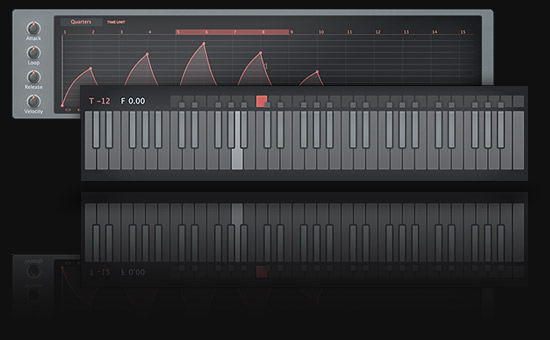
Creating new effects in MFM2 can be quite complex, depending on how deep you want to go! Below is a very brief introduction so you can get some idea of what awaits you as MFM2 tweaker...
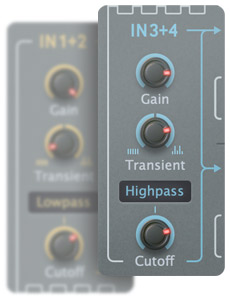
2 Input Processors
Input signals can be processed in pairs before being sent to the delay lines. The "Transient" controls suppress or boost spikes. The two non-resonant input filters can reduce the frequency range or even split the frequencies into two stereo bands with independent delay settings (set In 1+2 to Lowpass and In 3+4 to Highpass with the same Cutoff value).
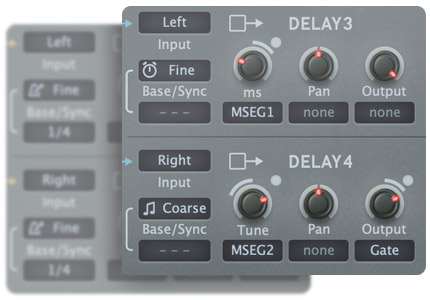
4 Delay Lines
Independent delay modes: synchronized, free, or even controlled by MIDI notes.
The dark field below each knob is a modulation source selector, and the amount of modulation is controlled by the "pip" which appears at the top right of the knob.
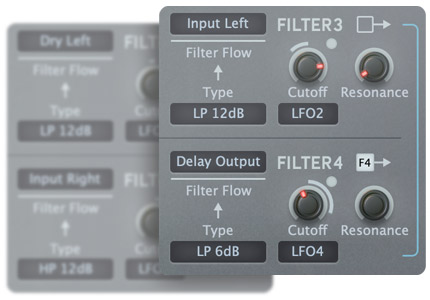
4 Main Filters
Resonant filters can be placed in various positions within the signal path. On offer here: 2x low pass, 2x high pass, band pass, band reject, allpass (phaser).
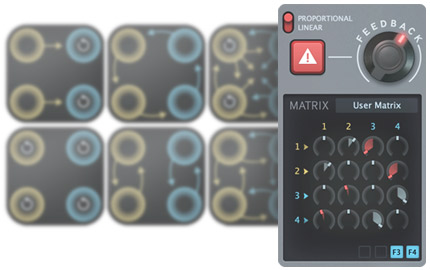
The Feedback Matrix
This is where you can specify how the delay lines feed into each other: The "User Matrix" option lets you freely route signals between all 4 delay lines.
The large control at the top adjusts the overall amount of feedback. At the bottom of the panel are the output level controls, allowing for normal and inverted polarity.
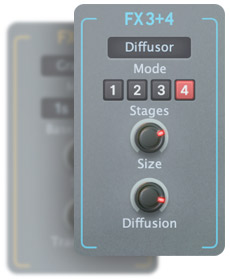
2 Effects
Pre-feedback processing. On offer here: limiter, bit crusher, phaser, frequency shifter, lowpass/highpass filter, granular pitch shifter, diffusor (reverb-ish).
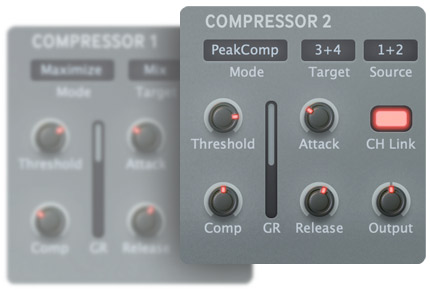
2 Compressors
The final polish! Peak or RMS mode compression. In PeakComp mode you can compress one pair of channels using a sidechain from the other.
Requirements
![]() Mac OS X 10.10 or newer
Mac OS X 10.10 or newer
or![]() Windows 7 or newer
Windows 7 or newer
or![]() Linux
Linux
- Host software / DAW
- 1GB RAM, more recommended
- 1000 × 600 or larger display
- 40-105 MB free disk space
- Modern CPU required:
Windows/Linux: Intel Nehalem or newer, AMD Bulldozer or newer
Mac: Intel Nehalem or newer, Apple M1
Formats
MFM2 is not a standalone product, it requires host software. MFM2 is compatible with nearly all DAWs.
macOS:
AUv2, VST2, VST3, CLAP (64-bit only)
temporarily no AAX (read more)
Windows:
VST2, VST3, AAX* (32-/64-bit)
CLAP (64-bit only)
* AAX requires Pro Tools 10.3.7 or later
![]()
VST is a trademark of Steinberg Media Technologies GmbH, registered in Europe and other countries.
